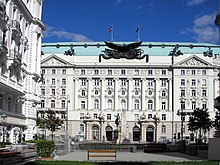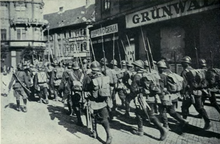Johann Boeriu of Polichna
Johann Boeriu Freiherr von Polichna (born October 10, 1859 in Waywodretschen , Fogaras county , † April 2, 1949 in Sibiu ) was an Austro-Hungarian officer ( field marshal lieutenant ) of Romanian origin , holder of the Military Maria Theresa Order and chairman of the professional honorary council in the Austro-Hungarian War Ministry , then Romanian division general .
Life
prehistory
Vaida-Recea was the headquarters of the 9th Company and the 2nd Battalion from the regiment of border guards, which had their headquarters in Orlat ( Sibiu County ). The regiment was responsible for 82 villages in the southern part of Transylvania between Hațeg and Tohanu Vechi . So it is not surprising that Ioan was the son of the former Romanian border soldier Ioan Boeriu and his wife Ana Pop, aunt of the later infantry general Leonidas von Popp . The future general completed his primary school at the border guards school in his town. After graduating with excellent results, he was enrolled at the Roman Catholic grammar school in Sibiu, where he also greatly improved his knowledge of the German language, which should be very useful for his future military career.
After graduating from high school, his parents urged him to study theology and later return to his home village as a priest. His mentor, the Austro-Hungarian Colonel and Theresa Knight David Urs de Margina , persuaded him to pursue a military career. In 1879 he finally registered at the Infantry Cadet School in Sibiu.
The officer
For Austria-Hungary
After graduating from cadet school, Boeriu was assigned to the 68th Infantry Regiment in the 4th Army Corps in Budapest , where he was a captain in 1900 . In 1905 he was promoted to the rank of major and was given command of a battalion of the 76th Infantry Regiment based in Gran (Esztergom) . After he was promoted to lieutenant colonel on May 1, 1909 , he was promoted to colonel and commander of the above-mentioned Hungarian infantry regiment " Freiherr von Salis-Soglio " No. 76 on May 1, 1914 .
When the First World War broke out , his regiment was sent to the Russian front. On the morning of August 23, 1914 , strong Russian units and only 18 battalions with 10 Austrian-Hungarian batteries were ready at Polichna not far from Kraśnik , on a front length of 30 km. At the head of his 76ers, the colonel waged a bitter struggle against the superior strength of the tsarist soldiers. In a loss-making, thirteen-hour struggle, often man against man, he succeeded in keeping the enemy occupied until the infantry regiments No. 12, 119 and 71 and the field cannon regiment No. 14 finally arrived. So the opponents could be crushed. Three flags, 18 artillery pieces and numerous machine guns were captured and 6,000 prisoners were taken. By maintaining the place, he created a prerequisite for the Austrian victory in the Battle of Kraśnik .
On November 24, 1914, after several days of heavy fighting, Boeriu succeeded in taking the Russian positions at Jangrot, which, however, could not be held because of the majority of the enemy. The Colonel had asked for his weakened regiment to be withdrawn, which was approved on the 27th of the month. The day before, Boeriu, who had been seriously wounded in combat, was taken into the hinterland.
For his exemplary and brave behavior, the officer was awarded the Knight's Cross of the Military Maria Theresa Order and the Knight's Cross of the Austrian Imperial Leopold Order with war decorations on September 11, 1915, and on the same day (rank of September 1 of the Year) promoted to major general.
Because of the consequences of his serious wound, the general was disabled in the war and was active as a war science expert, most recently as chairman of the professional honorary council in the kuk war ministry . In 1917 he was decorated with the Order of the Iron Crown, 1st class, and raised to the baron class with the predicate "von Polchina", which was to remind of his heroic deed. This was followed by an increase in rank with title and character to field marshal lieutenant on November 11, 1918. They are likely to be related to the events described below.
For the Kingdom of Romania
He took part in Alba Iulia in the Grand National Assembly of December 1, 1918, which had sanctioned the unification of the Romanian countries. Together with Iuliu Maniu , he got involved in an attempt to restore order in Vienna in autumn 1918. The Austrian capital was on the verge of a Bolshevik revolution and the army was in the process of disintegration. Boeriu contacted the Austro-Hungarian War Ministry and demanded that the soldiers of two barracks, mostly occupied by Romanians, be subordinated to him. In an appeal, he also called for all soldiers and officers of Romanian origin to report by January 1, 1919 for the purpose of integration into a Romanian-Transylvanian army. 50,000 men followed this call. He formed a true national Romanian army , he had over 60,000 soldiers in Vienna and the surrounding area, in the whole of Austria the number was 160,000. The soldiers were organized under the umbrella of a so-called "Romanian Military Senate" and were organized by Baron Ioan Boeriu directed. After order had been restored in Vienna and Prague , and the Romanian soldiers had impressed with their discipline and bravery, the troops went to Transylvania because of the threatened Hungarian military invasion . On the orders of Iuliu Maniu, the leader of the Romanian Transylvanians, the former Austro- Hungarian field marshal lieutenant as commander of all armed forces subordinate to the Romanian Council for Transylvania fought against the troops of the Hungarian Soviet Republic and their leader Béla Kun , which ended with the occupation of Budapest .
Boeriu was then corps general in the Kingdom of Romania and held the rank of division general and commander of the 7th Infantry Division in Sibiu . He helped build and structure the Romanian army . He finally retired on February 21, 1921. He was then a member of the Senate for one term. He was also a long-time member of the central committee of the literary association ASTRA ( Asociațiunea transilvană pentru literatura română și cultura poporului român , German: Transylvanian Association for Romanian Literature and the Culture of the Romanian People ) . Baron Ioan Boeriu was honored with the Grand Cross of the Order of the Crown of Romania by King Ferdinand I of Romania in 1921 . He then lived in seclusion in Sibiu, where he died of very old age, without marriage or children. He was buried in his hometown.
A museum in memory of General Ioan Boeriu was established in Recea commune.
Awards
A selection of the decorations acquired is shown here.
- Knight's Cross of the Military Maria Theresa Order , September 11, 1915 (Entry: 184th doctorate on August 17, 1918)
- Order of the Iron Crown 1st Class , 1917
- Order of the Iron Crown 3rd class with the war decoration , before 1916
- Knight's Cross of the Austrian-Imperial Leopold Order with the war decoration on September 11, 1915
- kk Military Merit Cross 2nd Class before 1916
- Military Merit Medal "Signum Laudis" , before 1916
- Grand Cross of the Order of the Crown of Romania , 1921
literature
- Boeriu von Polichna, Johann (1859–1919), Lieutenant Field Marshal. In: Austrian Biographical Lexicon 1815–1950 (ÖBL). Volume 1, Verlag der Österreichischen Akademie der Wissenschaften, Vienna 1957, p. 98.
- Dumitru Preda, Vasile Alexandrescu, Costică Prodan: În apărarea României Mari. Campania armatei române din 1918-1919. Editura Enciclopedică, Bucureşti, 1994, ISBN 973-45-0094-5
- Nicolae Tătăranu (General): Acum un sfert de veac - Amintiri din războiu. Editura Cartea Românească, Bucureşti 1940
- Liber Regius Hungariae. Volume LXXIII, p. 419 f.
Individual evidence
- ↑ The Border Guard School ("Şcoala grănicerească") ( Memento from March 25, 2014 in the Internet Archive ), on tarafagarasuluiromania.ro
- ↑ Boeriu von Polichna, Johann (1859-1919), Lieutenant Field Marshal. In: Austrian Biographical Lexicon 1815–1950 (ÖBL). Volume 1, Verlag der Österreichischen Akademie der Wissenschaften, Vienna 1957, p. 98.
- ↑ Schematism for the imperial and royal army and for the imperial and royal navy. KK Hof- und Staatsdruckerei, Vienna 1895, pp. 233, 530
- ↑ Eva Anna Welles: The faded war - From the field of honor into the darkness - History of a family in the time of the First World War. CCU Verlag, CCQ GmbH, Mödling 2014, p. 177 f.
- ↑ Eva Anna Welles: The faded war - From the field of honor into the darkness - History of a family in the time of the First World War. CCU Verlag, CCQ GmbH, Mödling 2014, p. 182 f.
- ↑ a b The kk or kuk generals 1816–1918. Austrian State Archives, 1907, p. 18
- ↑ nobilitashungariae: List of Historical Names of the Hungarian Nobility / A magyar történelmi nemesség családneveinek listája , on docs.lib.purdue.edu
- ↑ Miltary Maria Theresa Order - A to D , on austro-hungarian-army.co.uk
- ↑ a b Cum a creat baronul Ioan Boeriu Armata Românească a Transilvaniei , on newspad.ro
- ↑ - The Hermannstädter Chronik - , on roland-giesel.de
- ↑ Dumitru Preda: Generalul Henri Cihoski: un erou al României Mari. Editura Militară, Bucharest 1996, p. 100
- ↑ Victor V. Grecu: ASTRA, 1861-1950: 125 de ani de la înființare: Asociațiunea Transilvanǎ Pentru Literatura Românǎ și cultura poporului român. Academia Republicii Socialiste România, Secția de Științe Istorice: Societatea de Științe Filologice din RS România, Filiala Sibiu 1987, p. 107
- ^ Reich Ministry of War: Ranking lists of the imperial and royal armies. KK Hof- und Staatsdruckerei, Vienna 1916, p. 10
| personal data | |
|---|---|
| SURNAME | Boeriu from Polichna, Johann |
| ALTERNATIVE NAMES | Boeriu, Ioan; Boeriu, Ioan baron de; Boeriu, Johann; Boeriu von Polichna, Johann Freiherr (full name) |
| BRIEF DESCRIPTION | Austrian officer (general of the infantry), teacher, adjutant general and head of the military academy |
| DATE OF BIRTH | October 10, 1859 |
| PLACE OF BIRTH | Waywodretschen , Fogaras County |
| DATE OF DEATH | April 2, 1949 |
| Place of death | Sibiu |




